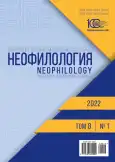The process of interaction between human and artificial intelligence in the mediaspace of a computer game
- Authors: Shesterin N.O.1, Shesterina A.M.2
-
Affiliations:
- National Research University Higher School of Economics
- Voronezh State University
- Issue: Vol 8, No 1 (2022)
- Pages: 128-136
- Section: MEDIA COMMUNICATIONS AND JOURNALISM
- URL: https://journal-vniispk.ru/2587-6953/article/view/301831
- DOI: https://doi.org/10.20310/2587-6953-2022-8-1-128-136
- ID: 301831
Cite item
Full Text
Abstract
The purpose of study is to establish ethical standards for the interaction between a human and artificial intelligence in the media space of a computer game. The relevance of study is determined, on the one hand, by the active mediatization of various spheres of our life and the strengthening of the role of gaming communication practices in shaping the media landscape as a whole, and on the other hand, by the intensive development of artificial intelligence technologies and the problems that arise in connection with this in human – artificial intelligence communication in the media sphere. As the main research methods, the content analysis method, cross-analysis and the historical-functional method are declared, on the basis of which the key forms of interaction between artificial intelligence and human in different types of games are established, and an ethical standard for such interaction is proposed, which can be extrapolated to media communication in general. It is determined that the typology of the roles performed by artificial intelligence in games can be built on the basis of such features as the complexity, complexity and internal structure of artificial intelligence. It turns out that human – artificial intelligence relations are built mainly on the following types of interaction: hostile, controlling, conditionally friendly and friendly. As fundamental ethical norms of communication in the human – artificial intelligence link, postulates are proposed based on the principle of equality of participants in the communication process, when the issue of not only the safety of the player is considered, but also the safety of the artificial intelligence, which acquires features that fit the definition of a living one.
About the authors
N. O. Shesterin
National Research University Higher School of Economics
Email: nshesterin@gmail.com
ORCID iD: 0000-0003-2134-8412
Master’s Degree Student in direction “System Game De-sign” of School of Design of Faculty of Communications, Media and Design
Russian Federation, 20 Myasnitskaya St., Moscow 101000, Russian FederationA. M. Shesterina
Voronezh State University
Author for correspondence.
Email: shesterina8@gmail.com
ORCID iD: 0000-0001-7270-2376
Doctor of Philology, Professor, Professor of Electronic Media and Speech Communication Department
Russian Federation, 1 Universitetskaya Sq., Voronezh 394000, Russian FederationReferences
- Volkova I.I. Komp’yuternyye igry i novyye media: igrovoy podkhod k kommunikatsiyam v virtual’nom pro-stranstve [Video games and new media: game approach to communications within virtual space]. Vestnik RUDN. Seriya: Literaturovedeniye. Zhurnalistika – Rudn Journal of Studies in Literature and Journalism, 2017, no. 2, pp. 312-320. (In Russian).
- Hulsebosch P. Control Review: Verwarrend, goed en kort. Tweakers. (In Dutch). Available at: https:// tweak-ers.net/reviews/7314/6/control-verwarrend-goed-en-kort-raytracing.html (accessed 02.09.2021).
- Shummon Maass L. Artificial Intelligence in Video Games. Towards data science. Available at: https:// to-wardsdatascience.com/artificial-intelligence-in-video-games-3e2566d59c22 (accessed 02.09.2021).
- Dickson B. Unfair Advantage: Don’t expect AI to play like a human. PCmag, Available at: https://www. pcmag.com/opinions/unfair-advantage-dont-expect-ai-to-play-like-a-human (accessed 02.09.2021).
- Zamkov A.V., Krasheninnikova M.A., Lukina M.M., Tsynareva N.A. Robotizirovannaya zhurnalistika: ot nauchnogo diskursa k zhurnalistskomu obrazovaniyu [Robotic journalism: from scientific discourse to journal-ism education]. Mediaskop – Mediascope, 2017, issue 2. (In Russian). Available at: http://www.media-scope.ru/2295 (accessed 30.03.2020).
- Diamond J. Zebras and the Anna Karenina principle. Natural History, 1994, no. 103, p. 4.
- Deisenroth M. A survey on policy search for robotics. Foundations and Trends in Robotics, 2013, no. 2, pp. 1-142.
- Pang B. Seeing stars: Exploiting class relationships for sentiment categorization with respect to rating scales. ACL, 2005, pp. 115-124.
- Schrodinger E. What is Life? With Mind and Matter and Autobiographical Sketches. Available at: http:// strangebeautiful.com/other-texts/schrodinger-what-is-life-mind-matter-auto-sketches.pdf (accessed: 17.09.2021).
- Challe T. The Rights of Nature – Can an Ecosystem Bear Legal Rights? Columbia Climate School. Available at: https://news.climate.columbia.edu/2021/04/22/rights-of-nature-lawsuits/ (accessed 17.09.2021).
- Mathew H. Plants as Persons: A Philosophical Botany. New York, State University of New York Press, 2011, 229 p.
- Simpson C. Behavior Trees for AI: How They Work. 2014. Gamasutra. Available at: https://www.gama-sutra.com/blogs/ChrisSimpson/20140717/221339/Behavior_trees_for_AI_How_they_work.php (accessed 17.09.2021).
Supplementary files









